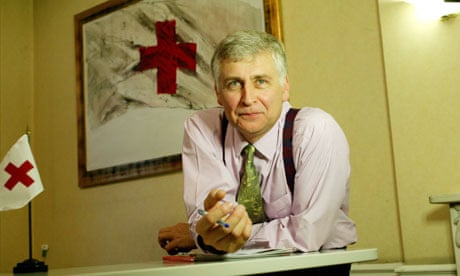Leading charities have defended the income of their chief executives after research revealed that the number receiving six-figure salaries at Britain's 14 biggest foreign aid charities has risen by nearly 60%, from 19 to 30, over the past three years.
The number of staff on salaries of more than £60,000 at charities – which form the 50-year-old Disasters Emergency Committee (DEC) and co-ordinate disaster relief during global emergencies – increased by 16%, to 192, between 2010 and 2012, the Daily Telegraph reported. Eleven of the executives were paid more than the prime minister's salary of £142,500 a year in 2013, while some senior staff at some charities had pay rises despite falling revenues and donations.
William Shawcross, the chairman of the Charity Commission, said trustees of the charities should assess pay to judge if it is appropriate. "It is not for the commission to tell charities how much they should pay their executives. That is a matter for their trustees," he told the newspaper. "However, in these difficult times, when many charities are experiencing shortfalls, trustees should consider whether very high salaries are really appropriate, and fair to both the donors and the taxpayers who fund charities. Disproportionate salaries risk bringing organisations and the wider charitable world into disrepute."
A spokesman for the DEC said the amounts paid to top executives was vital to attracting the best talent, and that they were "broadly in line" with other charities.
"The Disasters Emergency Committee plays no part in setting executive salaries at our member agencies but we believe these salaries are broadly in line with pay at other charities of comparable size," he said.
"To ensure the most effective use of appeal funds, a balance must be struck between minimising overheads and ensuring a robust management system is in place. Good management of emergency responses in the UK allows our member agencies to deliver the planning, monitoring, accountability and transparency that this work requires and that the public rightly demands."
The spokesman said the proportion of DEC appeal funds that can be spent by charities on UK management of their disaster responses is capped at 7%. "Over the past five years the DEC has raised over £193m for its appeals and the cost of raising those funds was less than 4% of that total."
The top earners whose pay increased included Sir Nicholas Young, the chief executive of the British Red Cross, who has received a 12% pay rise to £184,000 since 2010, despite a 1% fall in donations and a 3% fall in revenues.
Justin Forsyth, the chief executive of Save the Children, received £163,000 last year, while Anabel Hoult, its chief operating officer, was paid £168,653. Revenue at the charity has fallen by 3% since 2010, although donations are significantly up. A Save the Children spokesman said the charity paid competitive wages benchmarked against two external salary surveys. "We want to save more children's lives. We can't – and shouldn't – compete with salaries in the private sector, but we need to pay enough to ensure we get the best people to help our work to stop children dying needless deaths."
The salary of Chris Bain, the director of the Catholic aid charity Cafod, increased by 9% between 2010 and 2012, from £80,000 to £87,000. Over the same period donations and revenue rose 16% and 24% respectively. A Cafod spokesman said its director's pay "remains much lower than any of his counterparts in the biggest non-governmental organisations, and has only risen in recent years in line with the increase for other Cafod members of staff".
Richard Miller, the director at ActionAid, saw his pay rise by 8% to nearly £89,000 a year, while revenues and donations fell by 11%. Janet Convery, ActionAid's director of communications, said: "Richard Miller's salary is well below the market rate for a chief executive of a major development charity."
The top paid executive at Christian Aid was Loretta Minghella, a former chief executive of the Financial Services Compensation Scheme, who was paid £126,072 this year, up from £119,123 in 2011. A Christian Aid spokesman said the charity had a "strict policy that requires us to set salaries at or below the median of other church-based and/or international development agencies".
He said Minghella "brings substantial experience and skills in managing a large and complex operation to Christian Aid, strengths which are reflected in her salary that is on a level comparable with that of others of like position in the sector".








Comments (…)
Sign in or create your Guardian account to join the discussion